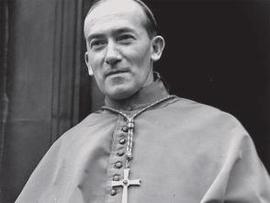The Dublin Diocesan Archives is based at Archbishop’s House, Drumcondra, headquarters of the Roman Catholic Archdiocese of Dublin. It has always been the most important of Ireland’s twenty-six dioceses on account of its location, size, resources and history, and this is reflected in its archival holdings. The vast bulk of its holdings are confined to the nineteenth and twentieth centuries, with the Archives possessing only a small amount of material covering the reigns of twelve Archbishops from 1600 to 1770.
The Diocesan Archives currently holds the papers of eleven successive archbishops of Dublin covering the period 1770 to 2004. Of these, the collections of eight Archbishops are available to be consulted by researchers, and the links at the bottom of this page will bring you to more information regarding each of these collections.
There are a number of other collections housed in the Archives. These include the combined surviving records of the Catholic Association, the New Catholic Association and the Loyal National Repeal Association, three vehicles for mass agitation in support of Catholic interest in the first half of the nineteenth century and all intimately linked to Daniel O’Connell; the Episcopal collections consist of the papers of four auxiliary Bishops of Dublin: Nicholas Donnelly (1880-1920), Patrick Dunne (1920-89), James Kavanagh (1940-98) and Bishop Desmond Williams (1983-97); the collection of priests and religious of the Archdiocese; and the colleges collection. The most notable of these relates to the records (mainly financial) of the diocesan seminary, Holy Cross College (1859-1956) and the papers of Bartholomew Woodlock (1860-1879), who succeeded John Henry Newman as rector of the Catholic University of Ireland.
The collection is of use to many disciplines including history, local history, sociology, law, architecture, genealogy, education, religion, to name but a few. It should also be noted that Parish Registers (Baptismal and Marriage) are still held by the local parish churches and are not housed at the Diocesan Archives.
Sem título
